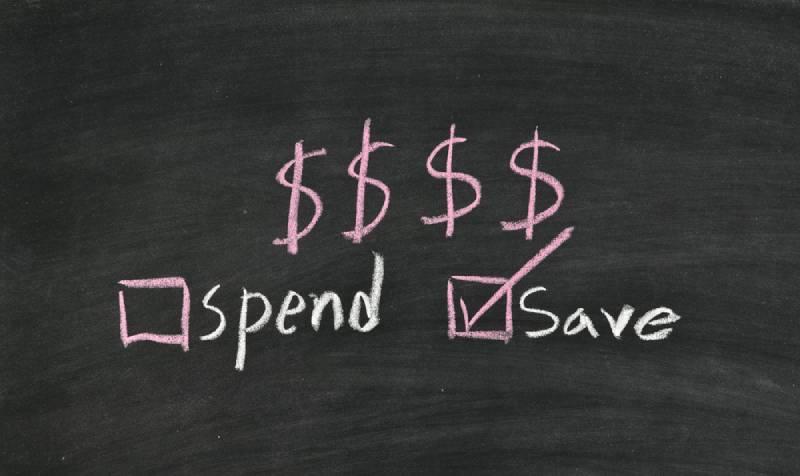One money-related disaster that you may run into is getting behind on bills.
A financial situation like this can make you feel like you are underwater, and reaching the surface gets harder and harder as most of the desperate measures you can take only succeed in pushing you further into debt.
Trying to catch up means so much struggle.
However, learning how to budget when you are behind on bills can help you get your finances under control.
A budget is a financial plan that allocates your earnings towards your expenses, savings, and debt pay-off.
It is an invaluable tool that can help you manage your finances and get you back on track, even when you seem to be falling behind on bills and accumulating new debts.
RELATED: Mistakes When Getting Out of Debt: 9 Mistakes To Avoid
When you fall behind on bills, you incur late fees that can vary from $25 to $35.
These late payment fees, overdraft fees, interest, and insufficient funds fees keep adding to your increasing credit card balance and drain your bank account.
However, managing your finances can be difficult if you are broke.
It’s particularly hard when you are behind on your bills, and you have no idea where to start.
When you find yourself in a financial situation like this, you simply need to follow this guide on how to budget when you are behind on bills.
Note that the basic steps in budgeting will not change, but your breakdown of expenses might change a little. Here are the things you need to do.
1. Change Your Mindset About Money

To make a change, you need a force to propel you.
In this case, making a change to your financial situation requires you to be tired of where you are currently.
You have to be fed up with your debts before you can devise ways of getting rid of them.
If you’re not tired of paying the penalties for being late on bills, you’re never going to see a need to try to catch up.
Create a vision instead, get angry at the debts you have piled up, make adjustments to your lifestyle, envision what the future will be if you start working towards getting out of debt, and having enough.
If you feel the need to be better, then you are ready to start budgeting and organize your bills.
2. Assess Your Financial Situation

If you have been avoiding taking a look at your financial state because you don’t want to see how bad things are, you need to think again, because you won’t know where to go if you don’t first understand where you are currently.
You can assess your financial situation with these steps:
-
Make a List of Your Bills

Compare how much you have to spend on bills every month with how much you earn.
To do this, you need to make a list of all your monthly expenses.
Your credit card and bank statement for the past two months can help you see where your money goes every month.
You can use a spreadsheet or a notebook to list all the expenses.
Your list may include bills like mortgage or rent, credit card payments, utilities (cellphone, electricity, water, cable, garbage, etc.), subscriptions (gym, newspaper, Netflix, Hulu, etc.), insurance payments (life, auto, health, etc.), other loan payments (such as student loan, vehicle loan, etc.), clothing, groceries, gas, and any other recurring expenses.
Indicate the due date for each fixed bill, the minimum payment, and the frequency.
Listing the bills according to their due date will help you have an idea of how they are positioned throughout the month.
-
Organize Your Expenses into Categories

After making a list of the things you spend money on every month, organize them all into three categories: debt, fixed expenses, and variable expenses.
The debt category will record all your debts, including those you are not making payments on yet.
Your fixed expense category will record all bills you have to pay every month, which are usually due around the same time, and the amount to be paid is often the same too.
For instance, mortgage, cable, etc.
The variable expense category will include expenses that change in value every month and do not have a fixed due date.
For instance, groceries, gas, etc.
When you have listed all your expenses, add them up and subtract the amount you have from the total amount you earn each month.
Typically, you have to make provisions for savings in your budget, but for now, you need to focus on catching up.
RELATED: How To Categorize Expenses: Personal Finance Management Tips
-
Find out Which Bills You are Behind on

From the debt and fixed monthly bills categories, highlight the bills that you are presently behind on and make them your top priority.
After highlighting the past due bills, find out how much you are behind by.
For example, if your monthly mortgage payment is $500 and you are one month behind, that means you are behind $500, that is, 1 x $500.
Write the amount next to the bill on the expense list.
3. Know The Options You Can Use

Though you may be behind on bills, you still have options.
Creditors may be willing to give you options if you make an effort to get caught up.
Your past-due bills list will help you see who your creditors are – call every one of them, try explaining your situation, and ask if they can offer you an option or payment plan.
They might let you pay every month until you get back on track.
What this means is that your regular monthly bills will have a part of the extra payment added to it until you are caught up completely, or they will let you make several fixed payments until you pay what you owe.
They may also offer other options that can help you.
It may feel embarrassing or scary doing this; however, you are not the only one struggling, and you never know the options you have until you ask.
When you make that call, be kind, courteous, respectful, and speak in a calm voice even though you may be frustrated.
Also, speak with confidence, and try to get the person on the other end of the phone to like you since it can make getting what you have in mind easier.
Also, remember to ask for more than you want so that you have more room to negotiate.
For instance, if you are behind on your mortgage and you want to set up monthly payments of $100 to get caught up, ask for $75 first.
You and your creditor want the same thing, which is to pay off what you owe, which means you both will have to be willing to compromise a little.
Your creditor will feel more comfortable negotiating with you if they think that you are eager to work with them.
4. Look For Problem Areas

You can start by looking at your spending habits.
After accounting for the different categories of expenses for every month, review your spending to see if there are unnecessary expenses or bills you can cut out or cut down, even if it is just for a while.
Check your expenses and see if you spend too much on food or your habits.
Find out where your spending weaknesses and budget leaks lie and have them in mind as you make your budget.
Your priority should be to catch up with your bills and avoid late fees, even if it means sacrificing the things you enjoy.
5. Look For Where You Can Make Changes

For a while, you will be paying more than the amount you pay on a regular day until you are caught back up, and that means you have to look for ways to free up money.
Try to cut out or cut down on expenses you can do without, at least until things get better.
Consider foregoing your Netflix subscription, or increasing your deductibles to save money.
See if you can dump your cell phone plan and share a plan with your partner, cancel the cable subscription, and lower your data usage to avoid high data charges.
You can also cancel your gym membership, and instead, take up free workout options like exercising at home with videos, riding a bike, or joining a workout group in your area.
You may only need to make these sacrifices temporarily and return to them after you are all caught up.
A frugal lifestyle will go a long way in helping you free up money.
The areas you can adopt frugal living for may differ from everyone else, but the goal is the same.
Take up as many frugal living strategies as you can to save money for your debts.
RELATED: How Do We Cut Our Budget When There’s Nothing Left To Cut?
6. Look For Ways to Increase Your Income

What are your hobbies or unique talents?
Can you turn them into sources of income? You can make money from your art, your knitting, or your writing.
Look for online jobs you can do from home, such as freelance writing, proofreading, consulting, telemarketing, selling on Amazon, language translations, etc.
Try to seize as many opportunities as you can handle to make extra money.
All you need is to put in a few hours of work every day from the comfort of your home.
Also, if you have items you don’t use anymore lying around the house or the yard, consider selling them off on Craigslist, eBay, and Amazon.
Look through your wardrobe and your husband’s wardrobe to see if you can find clothes you don’t need anymore.
There’s no point in keeping them if you don’t use them.
Look for your children’s clothes, toys, baby gear, etc. that you don’t need anymore and sell them off to people looking for second-hand items.
Bags, decorations, electronics, tools, etc. can also be put up for sale.
You get to free up storage space and earn more money from the sales.
RELATED: Make $50 A Day While Being A Stay At Home Mom: 21 Amazing Tips
7. Update Your Budget

For instance, if your negotiation with your creditor granted you the opportunity to pay an extra $100 every month along with your $500 monthly mortgage payment, you need to indicate the new $600 bill in your budget until you get caught up.
Also, you need to be realistic with the numbers you write down in your budget.
As you are reworking your budget, go through the numbers to ensure that they are practical.
If you set unrealistic limits in your budget, you will only end up failing.
For instance, do not write down $350 as your budget for food when you know you can’t go below $400.
Setting a lower budget limit may make you feel like you are working hard at achieving your goal but you may end up failing at that goal.
8. Be Flexible With Your Budget

At some point, you will succeed in paying off a debt or getting caught up on a bill, and this means that your priorities will have to change.
You need to be flexible enough with the budget such that you can make changes when it’s necessary.
You may need to add up some other expenses that come up, and this will be based on your new priorities.
The budget-making process remains the same; you only have to change the numbers.
9. Seek Help if Your Situation Falls Beyond What You Can Control

There are government programs that provide help to people who are struggling: consider applying for welfare or temporary assistance.
You can also go to a food bank for groceries.
Churches may also offer assistance to struggling members, do not underestimate what the church can do.
It may not be easy to open up and seek help; it may even feel a little bit embarrassing.
However, don’t fail to ask for help when you have no other alternative. You may end up receiving so much more than you expected.
10. Do Not Give up

Even if it seems like it’s getting increasingly difficult, do not be discouraged.
Once you achieve your financial goal and get back on track, you will be able to start working towards other powerful financial goals with the money you were previously putting towards your debt payment.
Wrap Up
In conclusion, budgeting is the answer if you have fallen behind on your bills and are looking for ways to get back on track.
When you create a budget calendar and stick to it, and also when you make a plan to tackle your past due bills and stick to it too, you are on your way to getting back on track and taking control of your finances.
However, it is one thing to succeed at getting caught up on your bills, and it’s another thing to make efforts to ensure you don’t return to such a financial situation.
Stick to your personal or household finance budget, set up an emergency fund if you don’t have one already, set up sinking funds for other expenses, control where your money goes, be prepared and then, live your life.
READ NEXT:
Saving Money Motivation: 10 Tips to Reach Your Savings Goals
Like this post? Please share or pin it for later. You can also stay in the loop and follow us on Facebook, Instagram and Pinterest.

This post contains affiliate links. Please see our full disclosure for more info.

